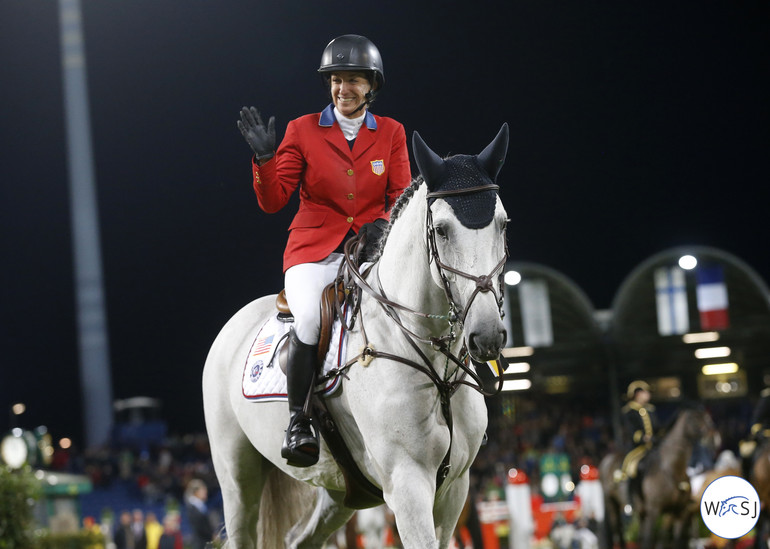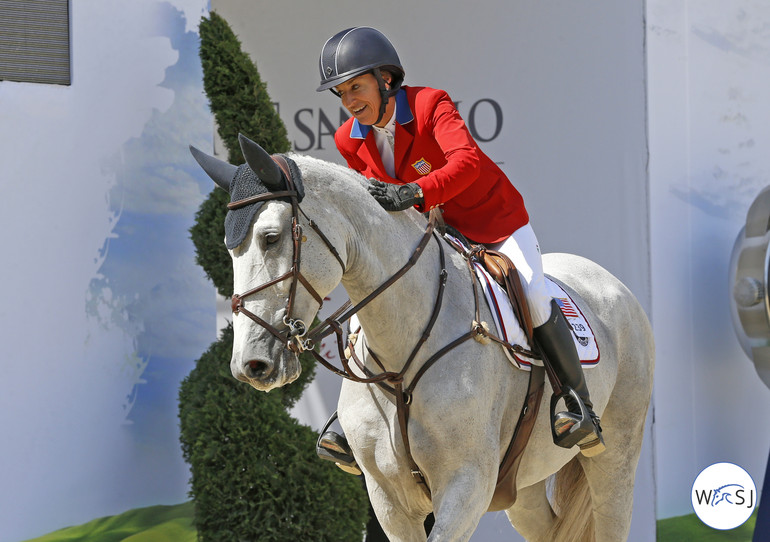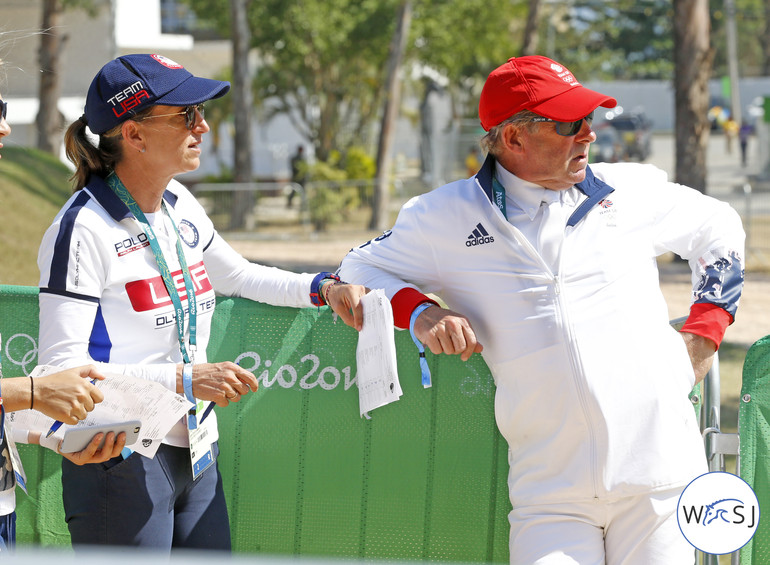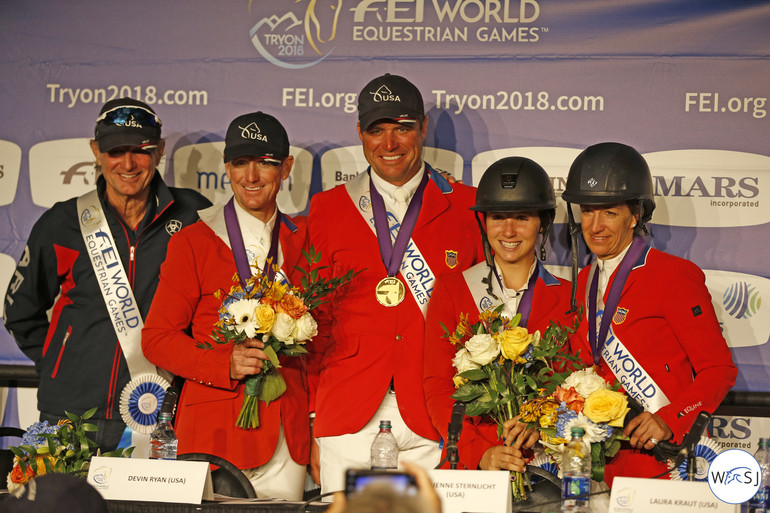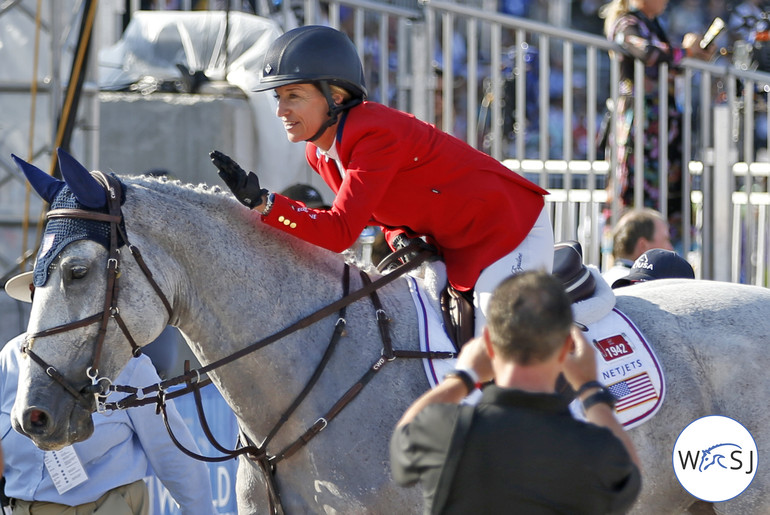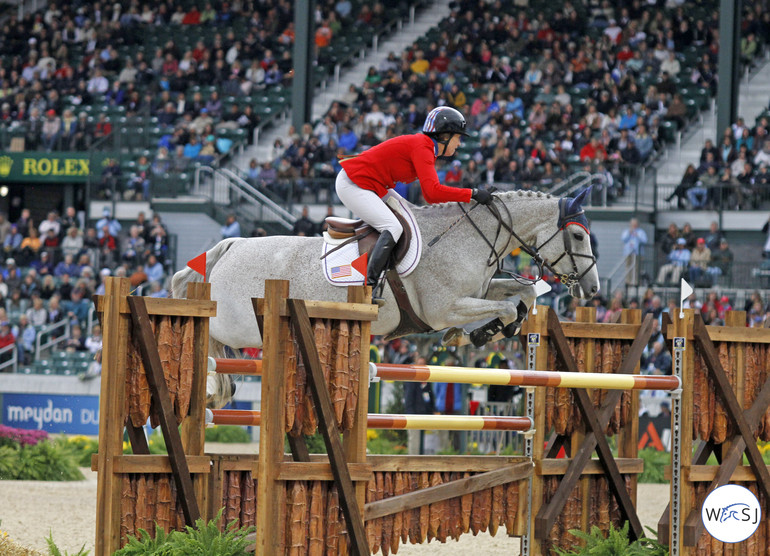Text © World of Showjumping
Team silver at the 2006 World Equestrian Games in Aachen, Olympic team gold in Hong Kong 2008, team gold at the 2018 World Equestrian Games in Tryon – Laura Kraut has been a mainstay on the US showjumping team for more than two decades. A huge inspiration to the younger generation, World of Showjumping met the American Olympic Champion.
“I am 54-years-old, and I still feel the same way about horses as I did when I was five,” Laura smiles. “I enjoy working with horses, I like teaching but ultimately I am just a horse crazy girl.”
“My mother was infatuated with horses, so I think I was born wanting to be around them,” Laura recalls. “As we grew up, my sister Mary Elizabeth and I would share ponies. However, the sport was already expensive and as a normal middle-class family it was something we could not really afford as I approached my teens. At this point, I was fortunate as I was asked to ride ponies for others – so me and my sister went to “work”. Until we were 18, we rode for Hunter Hill Farm. We got the opportunity to ride different kind of horses, learned how to saddle break youngsters, how to do all the jobs that were necessary from braiding to the veterinary end of it. I feel lucky, I got to learn a lot of things that I think young kids miss out on today. When you get to a higher level, having that knowledge is important.”
When she was nineteen, Laura decided to pursue an equestrian career. “I was going to college, but I really did not want to,” she tells. “After one semester, I said to my father that I thought it was a waste of both money and time. He told me that I could drop out, but that I had to pay for myself and get a job. I was thrilled with that!” Laura laughs. “I took a grooming job, made some money and started to ride more. Anybody that had a horse that needed riding, I would do it – I would ride anything. That is how I got started and it just evolved from there. I was what they in the US call a “catch rider” – I would go to a show with just my saddle. I remember one time in Kentucky, I rode 62 rounds in one day.”
“I don’t think I would make it in today’s world,” Laura reflects – pointing out how hard it is to break through for young talents with normal resources. “The opportunities that existed when I was young, just aren’t there anymore. In America, the hunters used to be a huge part of equestrian sports and that is how I earned my living in the beginning. Now, I think it is all very different. The kids that are exceptionally talented do get opportunities, but those who probably are talented but would need a bit of guidance don’t necessarily get that,” she explains. “I don’t think anyone would have picked me out of a crowd when I was 15. It was only because I worked and kept putting myself out there that I was able to create opportunities for myself.”
“In my opinion, the best way to move forward these days is to apprentice ride – find a dealer or a stable that maybe needs a second or a third rider. And don’t be afraid to work as hard as you can, and groom like I did. Take every opportunity you can get! That is my best advice,” Laura says.
Being a highly successful female in a male-dominated sport is something Laura does not think about. “Even though some horses are better suited for women and some are better suited for men, I believe that we are all in there in the same level playing field. Growing up, we actually thought we were the superior sex,” Laura continues with a smile. “At the barn, there was maybe one boy for every 50 girls – so we thought it was a girls’ sport, where we could let a few boys join in. However, when I came over to Europe the set-up was very different.”
As to the secret to her long and successful career, Laura reveals that next to her own stubbornness, loyal supporters have made the difference. “I also think I have been fortunate; I have had wonderful owners and great support from them. They are all in this for the right reasons and with the same intention; to do what is best for the horses. I have a lot of good people behind me. They have all been there for me and taken the good with the bad. They don’t jump ship and have given me the confidence to pick out horses. I just know what I like when I see it, and my owners have given me free reins. When you can have the freedom to make your own decisions as a rider – without people second guessing you – that is the key. From the first syndicate horse in 1998 until today, I have been able to keep going. I feel lucky.”
Laura’s team has obviously played a huge part in her success. Among the people most important to Laura is her partner Nick Skelton – 2016 Olympic Champion – as well as her sister Mary Elizabeth Kent. “My sister is the engine that runs everything. I show up and do what she tells me!” Laura smiles. “She organises everything, teaches a lot – she is great on the ground. We grew up together and see things the same; I trust her completely. I also have great staff working for me, they let me concentrate on what I need to.”
Laura points out that the latter is of big importance, as competing at top level is such a mental game. “Surely the physical side is important too – I don’t want to discredit that, but you have to be really sharp mentally,” she says. “To jump horses around in 1.60m classes and go into jump-offs against the likes of all the people that are out there now, you have to be really focused. If you are thinking about a horse that needs to ship down the road to get vetted, staff that is leaving – if you have to worry about all of that, it is nearly impossible to be one hundred percent focused. I am very fortunate to have Nick and other close family members help me out too, as it is not always easy to find the right people. You need a great team behind you.”
After so many years in the sport, Laura knows how to deal with all the ups and downs. “I keep saying that you have to be able to tackle a lot of hard moments – with horses, people and circumstances. It is not a sport for the weak, not at all. I’ve had thousands of bad moments – but there is one that really stands out, as sort of epic… To be sitting on the ground, at the third fence on the first day of the World Cup Finals in my home country,” she smiles.
“I had won the North-American League with Anthem. Ahead of the final I jumped him at a show where he did something funny in the jump-off, but I thought he was ok,” Laura tells. “I went to Las Vegas, got on him there and thought his back felt funny. However, I was revved and ready to go, all of his owners came – and there were many of them, because he was a syndicate-horse. I jumped fence one and two, made the turn to fence number three where he stopped and threw me off. And that was my World Cup Finals! That was an awful, very low moment for me. Anyhow, it turned out he did have an injury in his back and that is why he stopped – normally he would never, ever do that.”
To get past hardships like these, Laura has learned to stay eternally positive. “I actually put a lot of focus on this, and I try to keep myself in a straight line. I don’t allow very many highs, and I don’t allow any lows. You can be down for a moment, but then you need to get back to level ground. When something great happens, do celebrate, but remember that within seconds you have to bring it straight back. That is the way this sport works,” she says.
Above all, Laura is a team-player and her medals are a reflection of this. “I am very partial to team sports,” she says. “I really enjoy being a part of a winning team alongside the likes of McLain, Beezie, Margie and Lauren – from Hong Kong to Tryon, these championships have been great. I also feel like the championships have been an accomplishment to the horse that I have been riding – both Cedric and Zeremonie. I brought both of them up to that level; I got Zeremonie when she was five and had never shown, so I did everything with her. The journey with Cedric was similar; he was older when I got him but mentally younger than Zeremonie!” Laura laughs. “I like the fact that we have been able to develop these horses up to championship level.”
“What motivates me is the feeling of everything coming together,” Laura says. “That moment when everything is right, and you go in and win a class. Even today, I am excited to have won a class with my 7-year-old. And now, I know that tomorrow, something can go wrong. This sport will keep you humble. I think the beauty of it is working with the horses and learning something new every day.”
Speaking of horses… “Cedric, obviously, is always on the top of the list,” Laura smiles when reflecting over the many remarkable equine partners she has had. “And Anthem – he was really an amazing horse. I jumped both Anthem and Cedric internationally for ten years, so they were long-time partners for me. Another important horse for my career was a thoroughbred called Simba Run. I was the reserve rider for the Olympics in Barcelona with him, and I think he was the first horse that I ever sat on that had all ability and scope at a time when I didn’t even know yet what that meant. He taught me what it felt like to ride a horse that can jump. Zeremonie has done a lot for me too. I would also have to mention Big Star, because I found him – and for me he is one of the best horses I will ever see.”
Spending a few more minutes in the past, Laura reflects on how things have changed. “When I look back, it was less about business and more about the sport,” she says. “The business aspect has made people a lot more serious, and a little less fun. As a rider, you always wanted to win but it was a friendlier and more relaxed atmosphere.”
As for right here and now, Laura thinks the Covid-19 pandemic will leave permanent marks on the sport. “I think there will be less shows, but that might not be bad at all,” she says. “In my opinion, there was nothing wrong with having a couple of months off – staying at home, actually getting to work with your horses and your students. I don’t think it would be a horrible thing to see the calendar calm down just a bit. I wish we could find a solution where we would not have to be on the road for 48 weeks a year, chasing ranking points in order to stay on the top of the list to get invited to shows. That is something I would love to see change.”
And what future goals does Laura have? “Tokyo,” she replies. “I hope that I stay healthy and that my body continues to hold up. I would love to keep doing the sport at the level that I am for as long as I can. The minute I start to get weak or feel like I am not doing the job as I should, I think I will not do it anymore. However, I don’t see myself not riding – it is something I really love, and I know I will keep doing it forever.”
No reproduction withouth written permission, copyright © World of Showjumping



